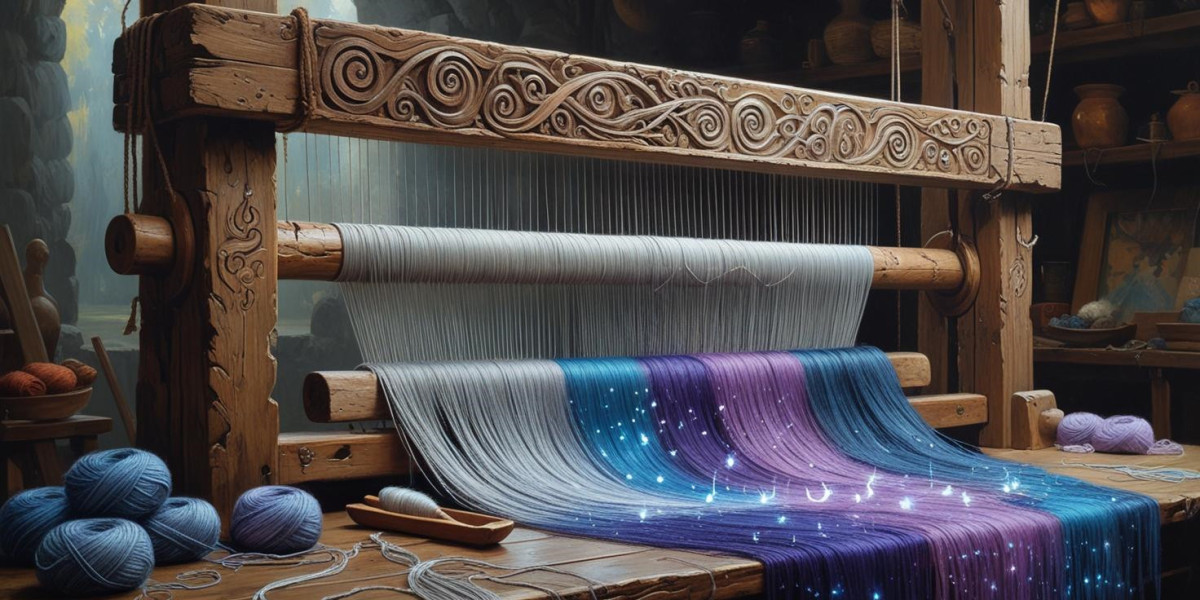The Memory Loom
The scent hit Marcus first—lavender and cedar mixed with something indefinable, something that made his teeth ache with nostalgia. He'd been dreading this return to his childhood home for weeks, but the estate couldn't settle itself. Now, standing in the doorway of the attic he'd been forbidden to enter as a child, he understood why his mother had always kept it locked.
The wooden loom dominated the cramped space, its frame carved with symbols that seemed to shift when he wasn't looking directly at them. Threads of impossible colors stretched across its width—some silver as moonlight on water, others deep purple like bruises on summer skin, and a few that appeared to be woven from captured starlight itself. The shuttle rested beside balls of yarn that hummed with their own quiet energy, and Marcus could swear he heard whispers emanating from the half-finished tapestry stretched taut across the frame.
He approached slowly, floorboards creaking beneath his feet like old bones. The threads trembled as he drew near, and when his fingers brushed against the tapestry's surface, the world tilted sideways.
The memory crashed over him like a rogue wave—
He was seven again, standing in the hallway outside this very door, pressing his small ear against the wood. His mother's voice drifted through, but she wasn't speaking English. The words were liquid and strange, punctuated by the rhythmic clicking of the loom. He'd pushed the door open just a crack and seen her there, weaving with threads that couldn't possibly exist, her fingers moving in patterns that left afterimages in the air.
"Marcus, you mustn't," she'd said without turning around, somehow knowing he was there. "Not yet. Not until you understand what we are."
"What are we, Mama?"
She'd turned then, and her eyes were full of starlight, just like the threads. "Keepers," she'd whispered. "Weavers of what was and what might be."
The memory released him, leaving him gasping in the dusty attic air. But something had changed. The threads now pulsed with recognition, and Marcus could see—actually see—the stories they held. Each strand contained a moment: his first kiss woven in rose gold, his graduation in deep blue, his mother's last breath in silver so pale it was almost transparent.
His hands moved without conscious thought, fingers finding the shuttle. The moment he touched it, understanding flooded through him. This wasn't just his mother's loom—it was his grandmother's, and her grandmother's before her. Generation after generation of women had sat here, weaving the threads of memory into something larger, something that held their family's story together across time.
But there was something wrong with the pattern. Gaps where threads should be, memories that ended abruptly or frayed at the edges. His mother's work, he realized, had been interrupted. Death had taken her before she could finish.
Marcus began to weave.
The threads guided him, showing him moments he'd forgotten: his mother singing lullabies in that liquid language, teaching him to see the shimmer around certain people that marked them as different, explaining why they moved so often and why he must never tell anyone about the things he could see. The memories were bittersweet as honey and wine, each one precious and painful.
As he worked, the tapestry began to reveal its true nature. This wasn't just a record of their family—it was their family, in a way that transcended simple documentation. Every thread was a life, every pattern a connection, every color an emotion given form. The loom didn't just store memories; it was memory, the collective unconscious of his bloodline made tangible.
Hours passed, or perhaps minutes—time moved strangely in the presence of the loom. Marcus wove until his fingers bled, until the pattern began to make sense, until the final thread clicked into place with an almost audible snap.
The tapestry shimmered, then began to fade.
"No," Marcus whispered, reaching for the dissolving threads. But they slipped through his fingers like morning mist, taking with them the impossible colors and the whispered voices. Within moments, nothing remained but an ordinary wooden loom, dusty with age and strung with common cotton thread.
Marcus blinked, disoriented. Had he imagined it all? But his fingers still tingled with residual magic, and when he looked down at his hands, he could see the faint shimmer that had always marked his mother's skin.
He understood now why she'd kept the attic locked, why she'd waited. The loom wasn't an object to be inherited—it was a test, a way of awakening what had always been dormant within him. The threads were gone because they were no longer needed. They lived within him now, every memory, every story, every connection that bound his family together across generations.
As Marcus descended the attic stairs for the last time, he realized the truth that would have terrified his seven-year-old self: he hadn't discovered an old loom in his mother's attic. He had discovered himself, and the inheritance that came not in the form of objects, but in the form of understanding.
The house could be sold now. The real treasure was walking down the stairs, humming an ancient lullaby in a language older than words, ready to begin weaving his own impossible threads into the fabric of the world.
